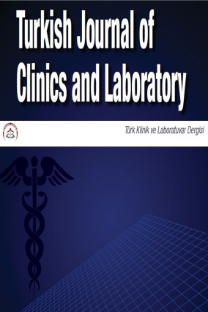Doğuştan kalp hastalığı olan çocukların annelerinin baş etme tutumlarının depresyon düzeyleri ile ilişkisi
Başa çıkma stratejileri, anne, doğuştan kalp hastalıkları, depresyon
Coping strategies and relation with depression levels of mothers of children with congenital heart diseases
Coping strategies, mother, congenital heart diseases, depression,
___
- Denniss DL, Sholler GF, Costa DSJ, et al. Need for Routine Screening of Health-Related Quality of Life in Families of Young Children with Complex Congenital Heart Disease. The Journal of pediatrics 2019; 205: 21-8.
- van der Linde D, Konings EE, Slager MA, et al. Birth prevalence of congenital heart disease worldwide: a systematic review and meta-analysis. Journal of the American College of Cardiology 2011; 58: 2241-7.
- Cantwell-Bartl AM, Tibballs J. Psychosocial experiences of parents of infants with hypoplastic left heart syndrome in the PICU. Pediatric critical care medicine : a journal of the Society of Critical Care Medicine and the World Federation of Pediatric Intensive and Critical Care Societies 2013; 14: 869-75.
- Sood E, Karpyn A, Demianczyk AC, et al. Mothers and Fathers Experience Stress of Congenital Heart Disease Differently: Recommendations for Pediatric Critical Care. Pediatric critical care medicine : a journal of the Society of Critical Care Medicine and the World Federation of Pediatric Intensive and Critical Care Societies 2018; 19: 626-34.
- Harvey KA, Kovalesky A, Woods RK, et al. Experiences of mothers of infants with congenital heart disease before, during, and after complex cardiac surgery. Heart & lung : the journal of critical care 2013; 42: 399-406.
- Re J, Dean S, Menahem S. Infant cardiac surgery: mothers tell their story: a therapeutic experience. World journal for pediatric & congenital heart surgery 2013; 4: 278-85.
- Golfenshtein N, Srulovici E, Deatrick JA. Interventions for Reducing Parenting Stress in Families With Pediatric Conditions: An Integrative Review. Journal of family nursing 2016; 22: 460-92.
- Davis CC, Brown RT, Bakeman R, et al. Psychological adaptation and adjustment of mothers of children with congenital heart disease: stress, coping, and family functioning. Journal of pediatric psychology 1998; 23: 219-28.
- Folkman S, Lazarus RS, Gruen RJ, et al. Appraisal, coping, health status, and psychological symptoms. Journal of personality and social psychology 1986; 50: 571-9.
- Carver CS, Scheier MF, Weintraub JK. Assessing coping strategies: a theoretically based approach. Journal of personality and social psychology 1989; 56: 267-83.
- Beck AT, Ward CH, Mendelson M, et al. An inventory for measuring depression. Arch Gen Psychiatry 1961; 4: 561-71.
- Hisli N. Beck depresyon envanterinin universite ogrencileri icin gecerliligi, guvenilirligi. (A reliability and validity study of Beck Depression Inventory in a university student sample). J Psychol 1989; 7: 3-13.
- Agargun M, Beşiroğlu L, Kıran ÜK, et al. The psychometric properties of the COPE inventory in Turkish sample: A preliminary research. Anatolian Journal of Psychiatry 2005; 6.
- Melnyk BM, Feinstein NF, Moldenhouer Z, et al. Coping in parents of children who are chronically ill: strategies for assessment and intervention. Pediatric nursing 2001; 27: 548-58.
- Wallander JL, Varni JW. Effects of pediatric chronic physical disorders on child and family adjustment. Journal of child psychology and psychiatry, and allied disciplines 1998; 39: 29-46.
- Thompson RJ, Jr., Gil KM, Gustafson KE, et al. Stability and change in the psychological adjustment of mothers of children and adolescents with cystic fibrosis and sickle cell disease. Journal of pediatric psychology 1994; 19: 171-88.
- Rao P, Pradhan PV, Shah H. Psychopathology and coping in parents of chronically ill children. Indian journal of pediatrics 2004; 71: 695-699.
- Geist R, Grdisa V, Otley A. Psychosocial issues in the child with chronic conditions. Best practice & research Clinical gastroenterology 2003; 17: 141-52.
- Hancock HS, Pituch K, Uzark K, et al. A randomised trial of early palliative care for maternal stress in infants prenatally diagnosed with single-ventricle heart disease. Cardiology in the young 2018; 28: 561-70.
- Solberg Ø, Dale MT, Holmstrøm H, et al. Long-term symptoms of depression and anxiety in mothers of infants with congenital heart defects. Journal of pediatric psychology 2011; 36: 179-87.
- Landolt MA, Ystrom E, Stene-Larsen K, et al. Exploring causal pathways of child behavior and maternal mental health in families with a child with congenital heart disease: a longitudinal study. Psychological medicine 2014; 44: 3421-33.
- McCusker CG, Doherty NN, Molloy B, et al. A controlled trial of early interventions to promote maternal adjustment and development in infants born with severe congenital heart disease. Child: care, health and development 2010; 36: 110-7.
- Lin CR, Tsai YF, Chang HL. Coping mechanisms of parents of children recently diagnosed with autism in Taiwan: a qualitative study. Journal of clinical nursing 2008; 17: 2733-40.
- Smith LE, Seltzer MM, Tager-Flusberg H, et al. A comparative analysis of well-being and coping among mothers of toddlers and mothers of adolescents with ASD. Journal of autism and developmental disorders 2008; 38: 876-89.
- Cop E, Dinç G, Kultur E. Coping Styles of Mothers of Children with Chronic Diseases and Their Relationship with Psychiatric Symptoms: A Preliminary Report. Turkish Journal of Pediatric Disease 2016.
- ISSN: 2149-8296
- Yayın Aralığı: 4
- Başlangıç: 2010
- Yayıncı: DNT Ortadoğu Yayıncılık AŞ
Feray Ferda ŞENOL, İlkay BAHÇECİ, Özlem AYTAÇ, Pınar ÖNER, Zülal AŞÇI TORAMAN
Özlem BİZPINAR MUNİS, Mümine Merve KOLSUZ, Ayşen KÖSE
Idyopatik ventriküler prematür komplexli hastalarda semptomlar ile QRS zamanı arasındaki ilişki
Halil AKIN, Bernas ALTINTAŞ, Flora OZKALAYCI, Ilyas KAYA, Adem AKTAN, Ayhan KUP, Rasit ONUK, Abdulkadir USLU, Abdurrahman AKYÜZ, Hasan Ali BARMAN
Febril nötropenik hastalarda bakteriyemi sıklığı, risk faktörleri ve epidemiyolojisi
Çiğdem EROL, Nuran SARI, Sahika Zeynep AKI, Esin ŞENOL
COVID-19 salgını sırasında yoğun bakım ünitesinde çalışan doktorların yaşadığı zorluklar
Helin ŞAHİNTÜRK, Irem Ulutas ORDU, Aykan GÜLLEROĞLU, Fatma YEŞİLER, Manat AITHAKANOVA, Ender GEDİK, Pınar ZEYNELOĞLU
Ferhat BORULU, Eyupserhat CALIK, Yasin KILIC, Bilgehan ERKUT
Nuran SARI, Çiğdem EROL, Kenan HIZEL
Solunumsal yoğun bakım ünitesinde perkütan endoskopik gastrostomi deneyimlerimiz
